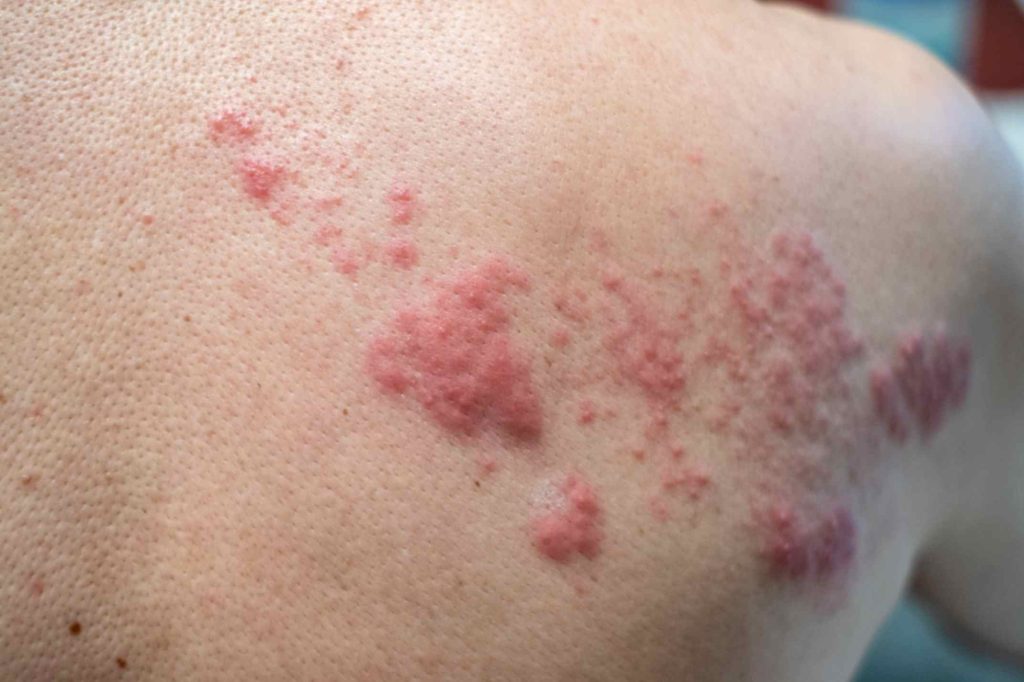
Shingles, also known as herpes zoster, is a painful skin and nerve condition caused by the reactivation of the varicella-zoster virus — the same virus responsible for chickenpox. According to a study, around 11.5% of adults in England have experienced shingles at some point in their lives.
Once you’ve had chickenpox, the virus remains dormant in your nerve cells and can reactivate years later, often when your immune system is weakened. Understanding what causes shingles and recognising its risk factors can help you take steps to prevent or manage outbreaks effectively.
What causes shingles?
The main cause of shingles is the varicella-zoster virus becoming active again after lying dormant in your nerve cells. This usually happens when your immune system becomes weaker with age, illness, or stress. The reactivated virus travels along nerve pathways to the skin, leading to pain, itching, and a blistering rash.
Why does the virus reactivate?
Several factors can trigger the virus to become active again:
- Ageing (especially over 50)
- Physical or emotional stress
- Conditions that weaken your immune system, such as HIV or cancer
- Certain medications like steroids or chemotherapy
- Recovering from major illness or surgery
Once reactivated, shingles can appear on any part of the body but most often affects one side of the torso or face.
Who is at higher risk of developing shingles?
Anyone who has had chickenpox can develop shingles, but some people are more likely to experience it.
Common shingles risk factors
- Weakened immunity: Long-term illness or medications that suppress your immune system increase your risk.
- Older age: Your immune response naturally weakens with time, making reactivation more likely after 50.
- High stress levels: Chronic stress can lower your body’s defences.
- Existing medical conditions: People with diabetes, lupus, or certain cancers are more susceptible.
Shingles and pregnancy
Pregnant women who have not had chickenpox or the vaccine should avoid contact with someone with shingles, as they could develop chickenpox. If you’re pregnant and unsure about your immunity, our pharmacists can help you understand your risks and discuss safe options for testing and prevention.
What are the early signs and symptoms of shingles?
Recognising shingles early can help you seek prompt treatment and reduce complications.
Early warning signs of shingles
Before the rash appears, you may feel:
- Tingling, burning, or sharp pain on one side of your body
- Sensitivity to touch
- Fatigue or mild fever
When the rash develops
Within a few days, clusters of red blisters appear. These typically:
- Form along a nerve line
- Fill with fluid before crusting over
- Last about two to four weeks
Even after the rash heals, some people experience lasting nerve pain, known as postherpetic neuralgia.
How can shingles be prevented or managed?
While shingles can’t always be avoided, certain steps can significantly reduce your risk and discomfort.
Shingles vaccination
A shingles vaccination can significantly lower your risk of developing the condition and reduce the severity of symptoms if it does occur. Even if you’re under 70 or not eligible for a public programme, you can still access private shingles vaccination through our pharmacy. Our pharmacists can explain the benefits, discuss your suitability, and help you stay protected against future outbreaks.
Effective shingles treatment
If you develop shingles, antiviral medicines are most effective when started early. Pain relief and soothing creams may also help ease discomfort. At Aroga Pharmacy, we provide professional shingles treatment and personalised support for people in and around Fulmer and East Burnham, helping you manage symptoms safely and recover comfortably.
When should you seek professional help?
You should seek prompt help if:
- The rash is near your eyes.
- You have severe pain or a spreading rash.
- You’re pregnant or have a weakened immune system.
- You experience prolonged or recurring shingles symptoms.
Getting timely care can prevent complications and speed up recovery.
Get help and relief from shingles today
Living with shingles can be painful, but with early treatment and the right support, recovery is completely manageable. Our team is here to help you stay comfortable and prevent future flare-ups.
If you live around Fulmer or East Burnham, book an appointment at Aroga Pharmacy in Farnham Common today. Our friendly pharmacists can help you manage symptoms, explore vaccination options, and guide you towards effective recovery.
FAQs
1. What is the main cause of shingles?
Shingles is caused by the varicella-zoster virus, the same virus responsible for chickenpox. After you recover from chickenpox, the virus stays inactive in your nerve cells and can reactivate years later, leading to shingles.
2. Who is most at risk of getting shingles?
People over 50, those with weakened immune systems, or individuals under high stress are more likely to develop shingles. Certain medical conditions, such as diabetes or cancer, and the use of immunosuppressing medicines can also increase your risk.
3. Can shingles be prevented?
Yes, the shingles vaccination is the most effective way to reduce your risk. It can also lessen the severity of symptoms if you do develop the condition. Speak to our pharmacists to check your eligibility for the shingles vaccination.
4. Is shingles dangerous during pregnancy?
Shingles is rare during pregnancy, but if you have never had chickenpox or the vaccine, you should avoid contact with anyone who has shingles. Pregnant women who contract chickenpox may face risks for both themselves and the baby.
5. How is shingles treated?
Treatment usually includes antiviral medicines, pain relief, and soothing creams, which help shorten the duration of the rash and prevent complications. You can also get personalised advice and support from our pharmacists if you live in or around Fulmer or East Burnham.
6. When should I see a pharmacist about shingles?
You should seek professional help as soon as you notice pain, tingling, or a rash on one side of your body. Early treatment works best, especially if started within 72 hours of symptoms appearing.
